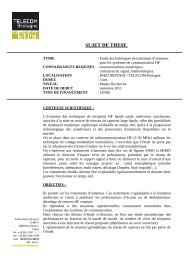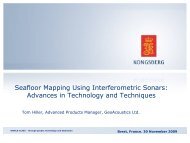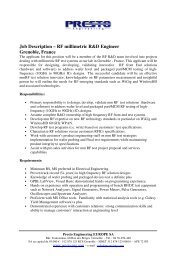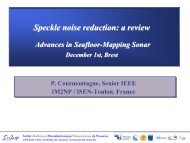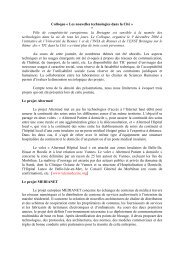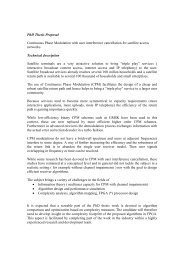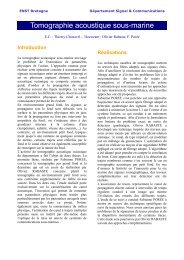Département Réseau, Sécurité et Multimédia Rapport d'Activités 2008
Département Réseau, Sécurité et Multimédia Rapport d'Activités 2008
Département Réseau, Sécurité et Multimédia Rapport d'Activités 2008
Create successful ePaper yourself
Turn your PDF publications into a flip-book with our unique Google optimized e-Paper software.
Policy AdministrationResearch Staff : Frédéric Cuppens, Nora Cuppens-Boulahia– Ph.D. Student: Meriam Ben GhorbelKeywords : Security policy, security configuration analysis, delegation, OrBACApplications : information system administrationPartners & Funding : Meriam Ben Ghorbel’s PhD thesis is co-advised with SupCom Tunis.IntroductionThe OrBAC model (Organization Based AccessControl) is an access control model developedin the RSM department of TELECOM Br<strong>et</strong>agne.This model is based on the concept oforganization. In this manner, the policyspecification is compl<strong>et</strong>ely param<strong>et</strong>erized bythe organization so that it is possible to handlesimultaneously several security policiesassociated with different organizations. Inother words, the security policy does notdirectly apply to subjects, actions and objects.Instead, it defines authorizations that applywithin an organization to control the activitiesperformed by roles on views.The OrBAC model is self administrated, that isthe concepts used to define an administrationpolicy, in the Administration model for OrBAC(AdOrBAC), are similar to the ones used todefine the remainder of the security policy.RealizationThe main purpose of this work is to provide acompl<strong>et</strong>e framework to specify delegationrequirements in the OrBAC model. Thedelegation is the process whereby a userwithout any administrative prerogativesobtains the ability to grant someauthorizations.We have shown, in [1,3], that it is possible tomanage administration requirements, includingdelegation requirements, in a unique model.This is thanks to the fact that the OrBAC modeloffers facilities, such as multi-granular license,contextual license, use of views, <strong>et</strong>c., whichprovide means to specify delegationcharacteristics without adding newcomponents or modifying the exiting ones.Therefore our approach is more flexible, moresimple and more compl<strong>et</strong>e than previousdelegation models. However, adding adelegation rules in the OrBAC model can beconflicting with administration rules.The approach used to manage conflicts inOrBAC is based on assigning priorities toaccess control rules. Nevertheless, toovercome difficulties encountered in Rule-BAC,we restate, in [2], the problems of ruleredundancy and potential conflicts usinginheritance mechanisms and separatedconstraints specification. We show that, usingthis approach, rule redundancy and potentialconflicts are tractable problems computable inpolynomial time.ConclusionThe future work will be dedicated to enrich ourdelegation model and more precisely therevocation mechanism.Moreover, since in the OrBAC model it is alsopossible to specify obligations, our model canbe enriched by the study of the delegation ofobligations. The notion of context is also veryuseful to deal with this aspect, for instance, wecan specify the bilateral agreement using aprovisional context. In further work we willdevelop this point.Future work also includes the enforcement ofthe delegation policies in MotOrBAC, theapplication prototype designed to manage Or-BAC policies.References[1] M. Ben Ghorbel-Talbi, F. Cuppens, N.Cuppens-Boulahia and A. Bouhoula. "ManagingDelegation in Access Control Models". InProceedings of the 15th InternationalConference on Advanced Computing andCommunication (ADCOM'07), Guwahati, Inde,December 2007. IEEE Computer Soci<strong>et</strong>y.[2] F. Cuppens, N. Cuppens-Boulahia, M. BenGhorbel. "High Level Conflict ManagementStrategies in Advanced Access Control Models".Electronic Notes in Theor<strong>et</strong>ical ComputerScience (ENTCS), Volume 186, Pages 3-26,Juill<strong>et</strong> 2007. Elsevier Science Publishers.[3] F. Cuppens, N. Cuppens, A. Bouhoula, M.Ben Ghorbel. “Delegation Model for ORBACModel : Extended Abstract”. In Proceedings ofthe 7th Tunisia-Japan Symposium on Science,Soci<strong>et</strong>y and Technology (TJASST'06), Sousse,Tunisia, December 2006.36 Extract of Pracom’s Annual Report <strong>2008</strong>




